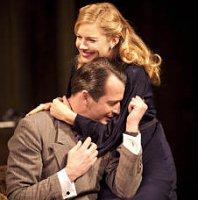Flare Path
A story of sacrifice, fear and duty, Terence Rattigan's play 'Flare Path' was first produced in the midst of the second world war. Wartime Prime Minister, Winston Churchill, described the play as a 'masterpiece of understatement'. A hit at that time, it still has relevance today, providing a snapshot of life for the bomber crews who flew endless tours to fight the Nazis with one of the few weapons at Britain's disposal. The play's title refers to the illumination of the runways in the hours of darkness to assist planes during take-off.
The play is set in the residents' lounge of the Falcon Hotel somewhere in Lincolnshire. On the hotel's doorstep lies an RAF airfield which is home to a squadron of Wellington bombers. These machines are flown night and day to locations over Germany with the intention of damaging productive capacity and civilian moral. The extensive bombing was later heavily criticized, since it resulted in huge loss of civilian life in Germany.
The hotel's occupants cover almost every strata of society. The hotel is run by Mrs Oakes (Sarah Crowden) who represents business. Youth and, to some extent, the working classes and those unable to be in active service in the armed forces, are represented by Percy, the waiter. Flight Lieutenant Teddy Graham and Sergeant Miller represent members of the flight crew, along with Polish officer, Flying Officer Count Skriczevinsky, who also represents other nations engaged in the war effort. The flight crew are intending spending the weekend with their wives - two of them are already in residence, and one arrives during the action.
The play starts with the arrival at the hotel of film star Peter Kyle (excellently played by James Purefoy). Although the residents believe him when he says he was passing by on the train and fancied staying for a night, he's actually in love with Mrs Graham (Sienna Miller) and wants her to leave her pilot husband. Though this is the central element in the plot, we also witness the pastimes of the air crew and their wives - drinking in excess to calm nerves and relieve tension - and the interactions between RAF crew and civilians.
Trevor Nunn's intense production is faithful, authentic and highly moving. Stephen Brimson Lewis's wood-panelled set is detailed and evocative. The only nod to modern technology is through the overhead projection which allows the audience to witness the night take-offs and the flare path which provides visibility, but also has the dangerous side-effect of attracting hostile aircraft.
The performances are also authentic, not least because the actors produce character traits from a different era, not from the present. You only have to watch old films produced at the time, or a little later, to see the differences in mannerisms and attitudes which are carefully captured by the cast here. For example, Lieutenant Graham is the bubbly, chipper pilot who, on the surface at least, can cope. But his demons lie just beneath the façade and when he breaks down, after a horrendous sortie, we see a man who is, quite literally, blinded by fear. It's an intensely moving scene, where Harry Hadden-Paton, in a very fine performance, weeps in a most distressing manner.
Sheridan Smith as Countess Skriczevinsky, otherwise Doris, is the chirpy ex-barmaid who, through a chance meeting, is the wife of Count Skriczevinsky now serving with the RAF. Ms Sheridan's performance is compelling and vivid. Not only does she have to cope with back-biting comments from others in the group, but she weeps when her Polish husband is missing, presumed dead. The only slight niggle I had about Ms Sheridan's performance is that her high-pitched, chirpy voice became a little irritating after a while, but that may well be that it reminded me of a real person as much as anything else.
There's fine support all round from a very able, well-directed cast. Clive Wood is the Squadron leader who, unable to fly, worries over his crew as though they are his children. Matthew Tennyson is the lively waiter, Percy, who eagerly follows the fortunes of his hero pilots, yet is sensitive enough to be able to comfort their wives when things turn out badly. And Sarah Crowden is the prim and proper hotel proprietress who, beneath her rather frosty exterior, harbours motherly admiration for the aircrew, cooking them eggs gained from illicit sources.
There was only a 50-50 chance of Second World War bomber air crews surviving the sorties they flew. The fear these young men endured was only barely kept in check, as Lieutenant Graham's breakdown in the second act aptly demonstrates to great effect. Restrained, or a 'masterpiece in understatement', Rattigan's play nevertheless gives us some insight into what airmen and their families and friends have to face. In 1942 when it was first produced, it did the same job - informing the general population of 'debts owed, which could never be repaid'. In its current incarnation, it's still a fine piece of theatre.
(Peter Brown)
"Magnificent revival...overwhelmingly moving."
Michael Billington for The Guardian
"Richly entertaining and beautifully judged revival of this theatrical rarity."
Paul Taylor for The Independent
"Superb production as a three-handkerchief weepie that somehow manages to be both profoundly moving and wonderfully funny."
Charles Spencer for The Daily Telegraph
"...tempted to nod off in parts...the pace limps along like a battle-battered Wellington bomber flying on one engine."
Paul Callan for The Daily Express
"Sir Trevor's direction is lucid and scrupulously precise...polished and potent."
Henry Hitchings for The Evening Standard
Originally published on
